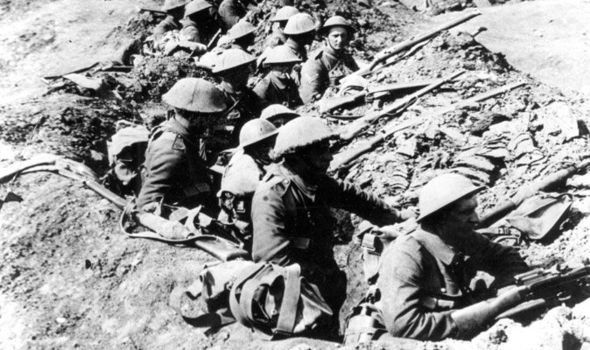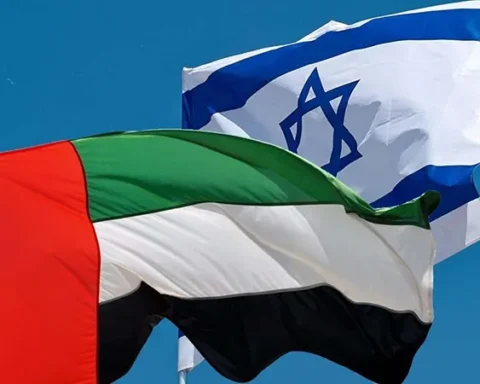100 years ago, the First World War was a devastating conflict in which many millions of people lost their lives and in which the political, social and even geographical state of the world was changed forever.
But, far from being the “war to end all wars”, the consequences of World War I are very much still relevant, still being felt today, particularly in regard to the Middle East.
The First World War was, after all, thought of as “the war to end all wars”, but within less than a generation of that apocalyptic conflict came the Second World War, the causes of which were directly traceable to World War I and specifically the terms of the Treaty of Versailles and the treatment of Germany.
World War II then was arguably just a continuation of World War I. And the Cold War that followed World War II was arguably still a result of World War I and the Russian Revolution: in theory, the Cold War continued until the end of the 1980s.
But it’s fascinating to note how much of today’s conflict is rooted also in the events of the First World War.
For example, the situation currently occurring in the Middle East is directly traceable to the events of World War I, albeit via a much longer period of time; the Balfour Declaration, the creation of the modern State of Israel in Palestine, the Sykes-Picot agreement, the creation of the Saudi Kingdom and its continuing influence on the region and on international politics, the Colonial carving up of Iraq, Syria and the Middle East – these, among other things, are all traced back to the events of World War I or its immediate aftermath.
Strictly speaking, of course, the war did end in 1918. But, if you factor in conflicts or scenarios originating in that war and still going on now, then you could argue that the war certainly wasn’t wrapped up with a tidy little bow in 1918.
The argument that World War I never really ended (or, at least, that we’re still living in its enormous shadow) was reinforced by, of all things, the advent of the so-called Islamic State group and the bloody chaos that ripped apart the heart of the Middle East in recent years – with ‘ISIS’ having literally talked about “the end of Sykes-Picot” as part of its ill-conceived ‘manifesto’.
The emergence of ‘ISIS’ (or at least the mass-media version of ‘ISIS’) was in 2014. What I noted with great interest at that time was that 2014 – precisely 100 years since the start of the First World War – seemed to see multiple crisis events unfold that could be linked to or rooted in the First World War or could’ve also been potential triggers for a modern cataclysmic conflict.
That was the year the Eastern Ukraine crisis unfolded – an event that could’ve easily acted as a ‘trigger’ for a bigger war. It was also the year Israel conducted its massive bombardment of Gaza in response to Hamas terrorist acts – reminding us that the consequences of the Balfour Declaration (during WWI) were still unfolding today and claiming lives (and so often threatening to spill out into a wider conflict – look at the amount of fighting in the Middle East relating to Israel in the last several decades: including Lebanon, the Arab/Israeli Wars and, arguably, Syria and everything relating to the ‘Yinon Plan’).
The Islamic State group, whatever its confused and rabid mission statement was, seemed to be interested in erasing the post-WWI carve-up of the region and creating a unified Arab world under its perverted and puritanical version of extreme Islam. To them, this was the Arab world that was denied to the region when the British and French decided to slice up the region according to their Colonial interests – and in particularly when the British refused to honour the war-time promises it had made to the leaders of the Arab Revolt.
Curiously, however, had the British honoured that promise, the unified and independent Arabia that would’ve been created would’ve been the complete opposite of the kind of medieval, barbaric ‘caliphate’ that the modern-day ‘ISIS’ fan-club wanted.
This would explain why one of the group’s early threats was to “chop off the head” of the King of Jordan (the only remaining Hashemite King): which was always curious. The Hashemites in Jordan are descendants (it was long claimed) of the Prophet Muhammad: they were also the family most involved with the Arab Revolt against the Ottomon Empire in World War I. It was the Hashemites who were promised rule over a unified Arabia in exchange for fighting alongside the British to defeat the Turks.

Instead, ‘Arabia’ was carved up into British and French ‘spheres of interest’ and the Saud family were given the seat of prominence in the Arab world and control of the Muslim holy cities.
The Hashemites held to a different, more moderate form of traditional Sunni Islam than the puritanical Wahhabism of the Saudis: a unified Arab world under Hashemite stewardship would’ve likely led to a moderate, even Westernised, Arab world. And, had the British Empire honoured its promises to the leaders of the Arab Revolt (principally Prince Feisal, son of Hussein – pictured below) – to the faction that had, after all, captured Damascus and helped the British to capture Jerusalem – we probably would’ve had the unified Arab world that ‘ISIS’ talked about. The difference is, of course, it would’ve been a more forward-looking, religiously moderate and tolerant world.
I’ve written here before that if you look at modern Jordan and compare it to Saudi Arabia, you can see the difference between a traditional, moderate Sunni Arab/Islamic society (Jordan) and a regressive, hostile puritanical state (Saudi Arabia). Jordan is by no means a democracy – but it is nevertheless a nation of completely different temperament and character to Saudi Arabia, with completely different dynamics and completely different ways of operating.

Both are monarchies and both based on Islam: but they are nothing like each other. You then can get a sense, perhaps, of what a Hashemite-led Arabia might’ve been like as compared to what a Saudi-centered Arab world has turned out to be like.
But that’s not how it played out.
Instead, after the war, the House of Saud was installed into the center of Arabia: and the rest of the region was divided up into various states (initially under British or French control). And we are still seeing the consequences of those decisions today.
This also applies to a number of other things presently playing out: for example, the situation with the Kurds fighting for an independent state in the Middle East (the Kurds were promised independence after the World War I fighting, just as the Arabs were – but didn’t see it materialise).
The events of World War I are still echoing in the national psyches or national mythologies of various countries. For example, in Turkey today the Erdogan era seems to be obsessed with the long-gone Ottoman Empire and some kind of return to the days before the First World War came along to ruin it.
Of course the biggest, most glaring unresolved territorial dispute of modern times is still probably the matter of Palestine.
In 2014, Israel’s military assault on Gaza amid the centenary of the First World War will have reminded some historical-minded observers to remember that the very creation of Israel has its roots in the era of the Great War: and in behind-the-scenes agendas, schemes and deal-making that was the true character of the war while millions of men were dying in abysmal conditions ‘for king and country’.
Yet, although often singled out, the Zionists were only one, relatively small factor in the complex equation. The agents and cabals of the imperialist powers – especially Britain and France – were engaged in their own schemes and double-dealing: ranging from their secretly-planned carve-up of the Middle East, the manipulation of Arabs and Kurds alike, to the perceived betrayal of their Russian counterparts and the excessive plot to inflict great and long-lasting damage on Germany.
And that’s to say nothing about the behind-the-scenes financiers and beneficiaries of the war, the banking conspiracies and the manipulation of the fates of entire nations and civilisations for the sake of elite goals and interests that the millions of dead men in the trenches had no clue about.

That’s one of the key components that is often overlooked in popular questions like “Could something like WWI ever happen again?” Because the answer to that question might depend not on whether the circumstances or strings of cause-and-effect could ever lead us into World War again, but on whether the same psychopathic elite interests and conspirators would still be willing to plunge civilisations into that kind of nightmare for the sake of their own agendas or ambitions.
I don’t have an answer to that question: but I look at what’s been inflicted on the populations of the Middle East in the last several years and it’s hard not to wonder if those psychopathic tendencies are still there.
The idea of a global conflict on the scale of the Great War but in our modern times is too horrifying to properly even contemplate or comprehend.
And, for various reasons, it probably would never happen again.
But the climate prior to the First World War was not dissimilar to the climate in the world today, certainly in parts of the world anyway. World War I wasn’t caused by the infamous assassination of the Archduke Franz Ferdinand (which itself is now generally held to have been a conspiracy involving multiple actors and connections, possibly with the full intention of triggering war); that was the spark that supposedly lit the fuse, but the various causal factors and situations had been building for some time beforehand in various countries and societies.
Most historians, though they might differ in their views as to whether the war was ‘necessary’ or even ‘pointless’ (the war was actually pointless – it did nothing but to drastically reduce the male population of Europe while setting up the foundations for World War II), do agree that the Great War was inevitable due to the concurrent unfolding of numerous situations, conditions and interests over a period of time.
All historians agree that the underlying causes of World War I, which began in the Balkans in late July 1914, were complicated and numerous; complicated and burdensome webs of alliances, imperialist agendas and rivalries, the growth of nationalism across Europe, several unresolved territorial disputes, a breakdown of the balance of power in Europe, convoluted and fragmented governance.
Most or even all of that sounds like you could be describing the situation today.
A century ago the final crisis came after what had been a long and complicated sequence of diplomatic clashes and conflicts of interest between the then Great Powers – Britain, Germany, France, Italy, Austria-Hungary, Russia and Turkey – over colonial, territorial and economic issues.
But also cited as a relevant causal factor were misinterpretations of intent and misunderstandings in diplomatic communications: watch various footage of Putin expressing dismay at Western foreign policy decisions – or watch interviews of a baffled Gaddafi in 2011 or a wearied Saddam in 2003 – and you can see that the same misunderstandings or misinterpretations of intent, reasoning or policy are still happening. The Gaddafi example is the most striking – because in those first few interviews he gave prior to the British-French-led NATO military assault on his country, he came across as if he genuinely couldn’t understand what NATO and the international community were trying to do or why.
Then there are the ‘unresolved territorial disputes’ – of which the Israel/Palestine problem is one. The eruption of the Eastern Ukraine crisis in 2014 came into that category and was a highly volatile, unpredictable situation that has already resulted in the shooting down of an international passenger plane and the killing of numerous innocent, foreign citizens. Further to that it has placed Russia in a position of antagonism with the West, particularly the US, though this was something that was already starting to happen as a result of the War in Syria.

The situation, in fact, with Russia today could be seen as analagous to the excessive demonisation of Germany during and prior to World War I.
We understand now that, in reality, the imperial powers in World War I wanted war with Germany simply because they couldn’t tolerate Germany’s growth as an international power: this was not only one of the central drivers for the mass sacrifice of millions of men, but was also the reason Britain and France imposed such harsh punishments on Germany after the war – to make sure Germany couldn’t ever become a player again and couldn’t become a rival to Britain and France.
Of course, that led directly to World War II. But the same sort of hegemony issue is in play today. You could argue that Western attitudes towards Russia falls into a not dissimilar category. You could say the same about the enmity towards Iran. I personally hate the Iranian regime: but the fact seems to be that Saudi Arabia, Israel, the US and co simply can’t tolerate Iran expanding its reach and influence, the same way Britain and France couldn’t stand to watch Germany rise.
All in all, you would have to say that not only are the same sorts of conditions and motivations present today (from the conflicting interests and agendas to the rise of nationalism and a potential breakdown of power in Europe) as were present to trigger the First World War – but actually much more so now than then, when you factor in all the additional triggers in the Middle East and some of the similarly “complex webs of burdensome alliances” that are regarded to have led to the First World War.
And the potential ‘triggers’ have been numerous: anything from 9/11 to the shooting down of MH-17 or the War in Syria.
The fact that it hasn’t happened may indicate a (wise) unwilligness on the part of various powers or agencies to ever let something like that unfold.
It may also be that various forms of ‘globalisation’ and inter-connectedness of countries and blocs has made such a thing that much more unlikely – which was, at least on the surface of it, kind of the point of ‘ever greater union’ and all that kind of stuff. Whether it was a good thing or not depends on your own point of view, but arguably one of the better results of World War I was the beginning of the end of traditional empires and the move towards more global, connected bodies.
Admittedly, not everyone would agree this was a good thing: and, in fact, we are now experiencing an across-the-board nationalist backlash against that state of affairs (which, I think, was what Emmanuel Macron was talking about in his speech at the Remembrance event on Sunday).
It’s worth saying that if the rise of nationalism was a factor in the conditions that led to WWI, then a resurgence of nationalism in the present day could mean that the next big conflagration (should it ever happen) would involve the idealogical split between Nationalism and Globalism.
It’s still unlikely that actual armed conflict would emerge from that divide. But, if international unions, alliances or agreements collapse, then a reversion to conflicting idealogies and incompatible national self-interests could eventually lead to major conflict.
In reality, a global war now would be fought with super weapons, technology and WMDs. So at least the contemporary casualties would be wiped out relatively quickly instead of suffering for years in muddy trenches before dying a horrible death. And, again, not everyone would agree this is a good thing.
And, again, it probably won’t happen – because we’ve probably evolved beyond that type of conflict.

But never underestimate our “betters” being willing to sacrifice substantial portions of the plebeian populations in the pursuit of larger agendas – as they did in World War I.
Because, again, as much as all of those aforementioned causes or sequences of ‘triggers’ may have contributed to the war, it is without question that the war itself was also a sought-after state-of-affairs by veiled, elite interests and conspiracies: and that therefore the real question isn’t whether ‘circumstances’ could lead to war, but whether those veiled interests will either allow or create ‘circumstances’ to lead to war.
The fact that, even with all the ‘triggers’ that could’ve sparked off such a catastrophe in the modern age (again, much more so than in the lead-in to World War I), our leaders, governments and institutions have thus far avoided such a conflagration demonstrates how easy it is to NOT go to all-out war: and reinforces how avoidable and unnecessary the horrors of World War I were – had vested interests not been desirous of the conflict.
One view is that highly-placed criminals, elites and mafias in various governments or countries would hold ‘war’ in place as the last card to play when their crimes have been exposed and the general populations have turned against them – a war, in other words, to divert popular discontent or possible uprisings or revolutions and to try to thin the herds while also using conflict to both increase wealth and re-assert control.
If you consider that World War I wasn’t just a series of unfortunate ‘triggers’ leading to catastrophe, but was actually a consciously-chosen undertaking – a manufactured horror story conducted by elite interests, bankers, and European royalty, in which millions of the male, lower-class population was sacrificed – then, as suggested earlier, you’d have to ask the question of whether such forces are still in play today and whether they would conspire to do similar things if it was seen as a way to preserve either longstanding plans or simple power.
All of this is also ignoring the famous masonic ‘Albert Pike’ letters, which supposedly predicted three orchestrated World Wars: a staple of conspiracy-theory lore, I’ve largely avoided it here because I’ve never been one-hundred percent sure about its legitimacy.
However, the one thing I will say for the Pike angle is that if both World Wars (and the third to come) were all planned in advance, the thing that would seem to support this theory is the fact – as highlighted earlier – that the first of those conflicts (World War I) happened to also contain within its events the seeds for the second and potentially for a third (particularly in regard to the Middle East).
Your perspective then depends on whether you think WWI was a callously plotted conspiracy or was simply a case of cause-and-effect, conflicting interests and appalling decision-making.
Although it actually could’ve been a mixture of both: with one, higher, level of conspirators contriving the circumstanecs of a conflict, but the general levels of leadership and decision-making being carried out by groups of people who genuinely thought they were reacting to cause-and-effect, conflicting interests and strategic concerns.
That would be the same state of affairs today too.
One thing is clear; that we live in a very, very dangerous time. And that far from being the “war to end all wars”, the horrific destruction of World War I in fact actually sowed the seeds for further, future conflict and loss of life well beyond the lifetimes of those whose decisions and policies were to blame.
In waging the First World War – itself a pointless, unnecessary and cruel war – the elites of the time not only brought mass death and destruction to that generation, but laid the seeds for World War II… and laid the seeds for further, future conflicts over a century later.
Read more: ‘Blackadder & the World War I Centenary‘, ‘From Balfour to the Holocaust: How the Zionist Project Won‘, ‘History Repeating: The Betrayal of the Kurds‘, ‘Wahhabism & Zionism: Twin Cancers in the Middle East‘, ‘What if the IRAQ WAR Had Never Happened?‘, ‘An Alternate Reality: Faisal, the Hashemites & the Kingdom of Jordan‘…





Very good article. You cover pretty much all the basic tenets behind why and how the war(s) started and who benefited. However, what you are seeing here are just a few of the trees.
Let me show you the forest (at least, as I currently understand it):
http://www.economicreason.com/usdollarcollapse/world-reserve-currencies-what-happened-during-previous-periods-of-transition/
Scroll down to that chart which shows the transition of the world’s reserve currency (since 1400). See how regular that is? Every 70-100 years – basically juuuusst longer than the average human lifetime – the reserve currency changes; and the changes *always* occur under conditions of strife and chaos…
…except for those who CONTROL the money:
https://www.globalresearch.ca/the-federal-reserve-cartel-the-eight-families/25080
(I love “Global Research”; they really do their homework. I find them to be a great resource.)
Only eight families have controlled the world’s reserve currency since the 1800’s. If you go farther back (all the way to Babylon), tracing the *maternal* blood line – not the paternal – you can add five more families to that list.
This is the matrix we have been enmeshed in for time immemorial. And you better believe that it hasn’t ended yet…
Thanks, Anthony – good references and input. Sorry I didn’t respond to your comment sooner: been very distracted.
“We ought not to forget that wars are a purely manufactured evil and are made according to a definite technique. A campaign for war is made upon as definite lines as a campaign for any other purpose. First, the people are worked upon. By clever tales the people’s suspicions are aroused towards the nation against whom war is desired. …. All you need for this is a few agents with some cleverness and no conscience and a press whose interest is locked up with the interests that will be benefitted by war. Then the ‘overt act’ will soon appear. It is no trick at all to get an ‘overt act’ once you work the hatred of two nations up to fever pitch.” (Henry Ford)
Seems to us that this old programme is being followed again. This time it’s those damned Russkies (who are in the same hands as the USA, the Chinese et al) or maybe the Iranians first……
Pike’s prophecy, fake or real, was unerringly correct.
The synagogue of satan, Frankists, Sabbateans etc care not for humanity, only that their evil will cause their Messiach to appear….
Naturally, first to go will be Israel, which is why so much effort was made to gather their tribe there in readiness for the prophesied culmination of the game.
The British conspiracy behind ww1 is beyond doubt as Docherty &MacGregors book hidden history makes evident. But many important additional aspects are hidden within masonic networks. They are the probable authors of documents like the protocols and the correspondence attributed to Pike Mazzini. And only Britain knew exactly what they were planning so they more than anyone would have been able to make plausible predictions.
One important freemasonic lodge was the Quatuor Coronati a Scottish Rite research branch.
They are associated with the creation/ support of both zionism and nazism. They have been stimulating a conflict surrounding the Temple Mount seemingly aiming to provoke ww3.
The biblical archeological society doing excavations in Jerusalem has been used as a cover for such provocations and one participant stated they (the jews) won’t rule here. That is in good agreement with the notions of such fundamentalists: that there will be an apocalyptic war fought by the jews whereafter they will convert to Christianity in time for the second coming of Christ.
The timing of the emancipation of german jews and Pikes, Bulwer Lyttons and Darby’s activities match a pattern where Britain was in a hurry to prevent the jews from assimilating and to populate Palestine with them. The seemingly absurd theme of British Israelism expressed by a sequence of influential Brittons from the 1500s and until recently underlines that the Israel project was nothing but an imperial design with the jews as expendables if the end-times scenario expected by the warmongering Christian Zionists was to transpire.
Lyndon Larouche and some associates have also brought light on the role of the Venetians and the black nobility as an additional influential factor. Britains historical ties to their nobility, apparently translates into the recurrent divisive tactics Britain always seems to use: encouraging arabs and jews from both directions to slaughter each other. The jews were encouraged by british agents with phrases like ‘one hundred eyes for a tooth’.
One quote illustrating British Israelism:
Source EIR Volume 27, Number 43, November 3, 2000
Temple Mount Fanatics Foment a New Thirty Years’ War by an EIR Investigative Team
“Through months of investigation, more than 30 inter- views, and a review of thousands of pages of primary source documents, some never previously made public, EIR has es-
tablished that the entire Temple Mount provocation is being run, top-down, by the most lunatic elements within the highest levels of British Freemasonry—with the blessing and
involvement of members of the House of Windsor.
This Masonic control is exerted through the Quatuor Coronati “research” lodge of the Grand Mother Lodge of British Freemasonry, headed by the Queen’s first cousin, the Duke
of Kent, and run on a day-to-day basis by the Seventh Marquess of Northampton (Spencer “Spenny” Douglas David Compton), a maternal descendant of the Baring family, of
British East India Company notoriety.
Lord Northampton, who has been atop the Temple Mount conducting “Temple studies,” candidly has admitted in interviews, that he is an adherent of British Israelism, which holds
that the British oligarchy has mystical powers, because England was colonized by one of the lost tribes of Israel. “Ithink the tradition of the Kabbalah is very strong in England,
because I think one of the lost tribes came to England. And Ithink you can spot them, quite clearly, in old English families.
I am sure you can. I know they came to Ireland, then to thenorth of Wales, and then down into England. And then thatbecame some of the oldest families we have.”
He ranted on that America, too, had been colonized by another of the lost Tribes. “That was all predicted, that one would go to Hyperborea, the land of the north, and one would go across the sea. And so I think that America and England got the Two Lost Tribes, and that is why they then, in a very intellectual Jewish way, started to run the world!”
Lord Northampton is, by his own admission, a practitioner of the Satanic rituals of Aleister Crowley. Indeed, as he explained to an interviewer, Lord Northampton installed one of the world’s leading “scholars” of the Golden Dawn cult, R.A. Gilbert, as the editor-in-chief of Ars Quatuor Coronarum, the theoretical journal of the lodge. Crowley had written an account of his “spiritual progress” in magic and Satanism under the title The Temple of Solomon the King
Great stuff, Petergrafstrm: invaluable perspective as ever. I keep wondering if we’re very much in the ‘Age of Crowleyanity’ – as Crowley himself predicted would come to pass.
On the issue of the Jewish migration to Israel being a British plot, with Jews being manipulated: are you saying that Jewish people in general were/are unaware of the manipulation – or that even the actual Zionist operators themselves were unaware of being manipulated? Or are you subscribing to the view that the adherents of the ‘Zionist’ project were not real Jews anyway? I’m sure we’ve discussed this before – but it’s hard sometimes to keep track.